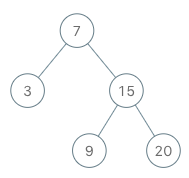173. Binary Search Tree Iterator (Medium)
https://leetcode.com/problems/binary-search-tree-iterator/
Implement an iterator over a binary search tree (BST). Your iterator will be initialized with the root node of a BST.
Calling next() will return the next smallest number in the BST.
Example:

BSTIterator iterator = new BSTIterator(root); iterator.next(); // return 3 iterator.next(); // return 7 iterator.hasNext(); // return true iterator.next(); // return 9 iterator.hasNext(); // return true iterator.next(); // return 15 iterator.hasNext(); // return true iterator.next(); // return 20 iterator.hasNext(); // return false
Note:
next()andhasNext()should run in average O(1) time and uses O(h) memory, where h is the height of the tree.- You may assume that
next()call will always be valid, that is, there will be at least a next smallest number in the BST whennext()is called.
Solutions
https://www.programcreek.com/2014/04/leetcode-binary-search-tree-iterator-java/
class BSTIterator {
Stack<TreeNode> stack;
public BSTIterator(TreeNode root) {
stack = new Stack<>();
// left section is always smaller, visit left at first
pushLeft(root);
}
public boolean hasNext() {
return !stack.isEmpty();
}
public int next() {
TreeNode node = stack.pop();
int result = node.val;
// 'node' will be visited only if its left children nodes are all visited
// since 'node' visited, then visit its right children nodes
if (node.right != null) {
node = node.right;
pushLeft(node);
}
return result;
}
public void pushLeft(TreeNode node) {
while (node != null) {
stack.push(node);
node = node.left;
}
}
}